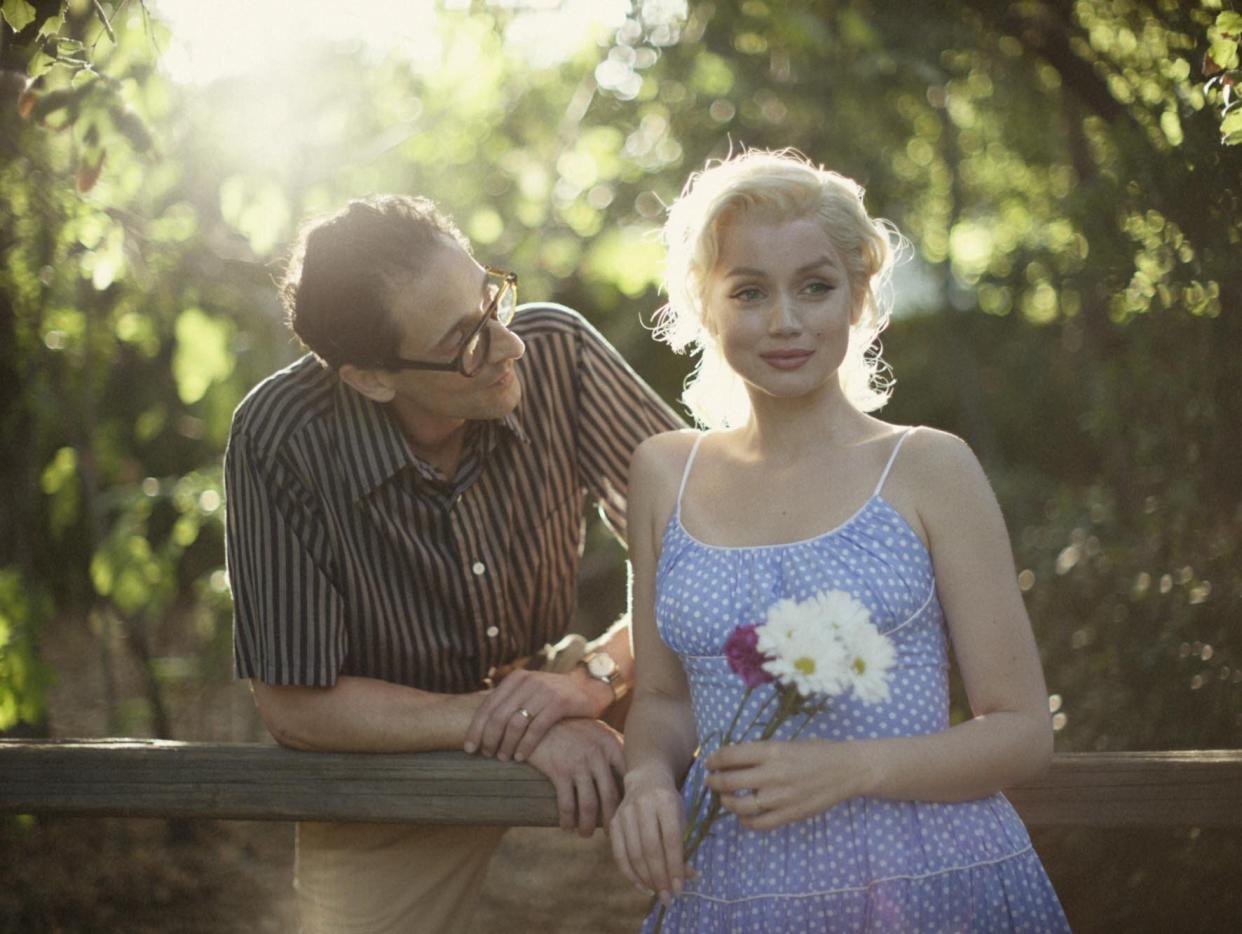Blonde review: A bleakly arty biopic misses the mark — and the spark

- Oops!Something went wrong.Please try again later.
In the business of biopics, what becomes a legend most? Earlier this year, Baz Luhrman's Elvis offered a portrait of the artist as a fever-dream highlight reel, all Technicolor dazzle and lascivious crotch zooms. Several months later, writer-director Andrew Dominik (The Assassination of Jesse James by the Coward Robert Ford) arrives with his own auteur vision of Marilyn Monroe: an airless, disjointed, occasionally gorgeous arthouse collage that somehow manages to spend nearly three hours reducing a cultural icon to less than the sum of her parts.
Which is not to say that all parts of star Ana de Armas aren't put on display, relentlessly; she spends long stretches of the movie nude, and several scenes go where only OB-GYNs have gone before. The already-notorious NC-17 rating that precedes the film (in theaters now and on Netflix Sept. 28) actually turns out to be a strange misdirection: As pornography, Blonde is tame, even boring. As exploitation it's far more explicit, portraying the actress as a disturbed woman-child with no agency, no joy, and no real allies in the world, a doomed butterfly bent again and again on the wheel of fame and our own insatiable voyeurism.
Not, in Dominik's telling, that she ever stood a chance. Her mother (Mare of Easttown's Julianne Nicholson) is a character straight out of Tennessee Williams, a raging mentally-ill alcoholic with delusions of grandeur, screaming abuse at the daughter she never asked for and occasionally attempting to drown her in the bathtub. What she leaves little Norma Jeane with by the time she's carted away is primarily PTSD, and an enduring obsession with the elusive father she never met. (He's someone very important in show business is all she knows, or at least has repeatedly been told.) Norma Jeane's subsequent time in orphanages and foster care is mostly implied, glossed over in favor of smash-cutting straight to Marilyn the starlet: dimpled, gleaming, platinum to the root.

Netflix Adrien Brody and Ana de Armas as Arthur Miller and Marilyn Monroe in 'Blonde'
To be fair, the film's structure is the work of Joyce Carol Oates, whose impressionistic 2000 novel Dominik pulls his source material from. Her version clocked in at nearly 750 pages; his, heroically, moves through the entirety of Monroe's life in just under 170 minutes. Many of the iconic screen moments and love interests are here, faithfully replicated in some form: the brief, contentious marriage to Joe DiMaggio (Bobby Cannavale) and longer but no less ill-fated pivot to Arthur Miller (Adrien Brody); epochal re-creations from The Seven Year Itch, Some Like It Hot, and Gentlemen Prefer Blondes. John F. Kennedy, represented here as a casually cruel bully who handles her like cargo, duly makes an appearance — in a single scene just long enough for Marilyn to give him a coerced blow job in extreme closeup, while her eyes fill with tears and she castigates herself in an inner monologue not to choke or throw up on the Presidential baton.
That's the stuff Blonde is pretty much made of: small, faraway glimpses of glamour and glory, subsumed by misery. Monroe speaks earnestly of hopes and dreams, just a girl who wants to better herself through Chekhov and make beautiful babies. But mostly she staggers around calling men who aren't her daddy "Daddy" and staining movie sets and red-carpet premieres with her tears. There's no role she actually wants to play once she lands it, and no aspect of being a star that she enjoys; from the very beginning it's less a career than a cross to bear. More ad-hoc tragedies are piled on by the script when true history does not suffice, or whenever she dares to veer too close to happiness.
What the story lacks in personal fulfillment, Dominik colors in with own cinematic imagination, turning an orgasm into a waterfall that becomes the 1953 noir Niagara and conjuring a glowing in-utero fetus straight out of 2001: A Space Odyssey. The film stock toggles between creamy, high-contrast black and white and saturated color; frames shimmer and melt like psychedelic taffy. As busy as it is with the outlines of biography, though, the screenplay rarely bothers with cohesion or momentum. It's just a series of evocative, increasingly distressing set pieces, a slow-motion car wreck wending toward its inevitable end.
De Armas, breathy and luminous, gamely submits to it all, and the resemblance once she's bewigged and be-moled is startling, particularly when Dominik replicates certain films and photo shoots exactly. (Her native Cuban accent, painstakingly minimized, hardly disrupts the level of non-reality already happening on screen, but it is distracting.) The main thing the movie misses in portraying Marilyn solely as a tragic sex bomb isn't just the pleasure that Monroe herself brought to millions, but de Armas's inner light too. The spark and vitality so evident in previous projects like Knives Out and No Time to Die has been smothered down to one note: walking wound. What's left is mostly empty iconography and a few indelible images, a bombastic curiosity wrapped in the guise of high art. Some like it cold. Grade: D+
Related content:

